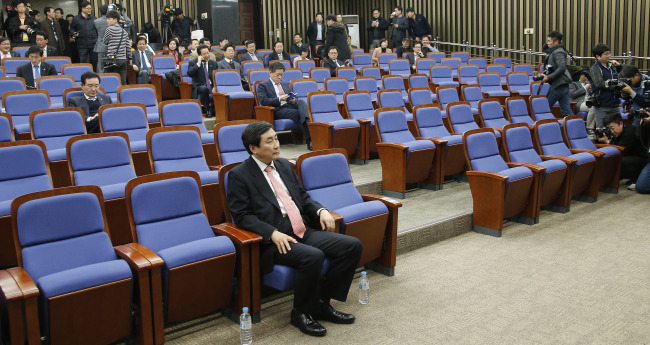The defection of Rep. Ahn Cheol-soo and the looming split of the party is a heavy blow to the New Politics Alliance for Democracy, with only four months remaining until the next parliamentary elections.
But it is also a repetition of history for a party that has experienced countless divisions and mergers over the past six decades.
All through the years, the opposition camp has had an unwritten rule: Integration leads to victory and division to defeat.
It is for such reason that the ongoing split of the NPAD is feared by the opposition to favor the ruling conservative Saenuri Party in the 2016 general elections, as well as in the 2017 presidential election.
But it is also a repetition of history for a party that has experienced countless divisions and mergers over the past six decades.
All through the years, the opposition camp has had an unwritten rule: Integration leads to victory and division to defeat.
It is for such reason that the ongoing split of the NPAD is feared by the opposition to favor the ruling conservative Saenuri Party in the 2016 general elections, as well as in the 2017 presidential election.

The tangled factional divide of the NPAD goes back a long way.
The NPAD, a coalition of the former Democratic Party and Ahn’s reform-driven political clique, traces its root back to the initial Democratic Party founded in 1955 by independence activists.
But its more direct connection is to the Peace Democratic Party, established by the late President Kim Dae-jung in 1987 in the backlash to the then-main opposition Unification Democratic Party’s nomination of Kim Young-sam as its presidential candidate.
The division of the two top opposition figures only acted in favor of the then-ruling Democratic Justice Party and its presidential candidate Roh Tae-woo, who won that year’s presidential race.
When Kim Dae-jung was elected president in 1997, thanks to an eleventh-hour candidacy unification with rival Kim Jong-pil, it seemed the feud-ridden opposition party would finally gather under a single flag.
The in-party peace, however, did not last long. As soon as late President Roh Moo-hyun, then a relatively rookie politician with explosive popularity, took office in 2003, his aides broke away and established the Uri Party.
Roh’s party was for a time the ruling party in 2004-2006, but after experiencing a crushing defeat in the 2006 local elections, soon gave in and joined forces with some DP defectors to create the United New Democratic Party.
Even after the merger, the infighting between Kim Dae-jung aides and pro-Roh figures persisted.
This later expanded into a multilateral conflict upon the appearance of independent Ahn, who claimed that the two conventional factions ”held on to their vested rights and to old political practices.“
Some experts suggest that the ongoing division of the opposition camp may not be seen as the equivalent to the frequent reorganizing in the past.
“In the past, the opposition circles had this pivotal political figure named Kim Dae-jung,” said Kim Jun-seok, professor for politics and foreign affairs at Dongkuk University.
”Even after party breakups, members could quickly flock around Kim without further dispersion.“
This is no longer the case for the NPAD, which is why it may be hit harder by the division than its former bodies did in the past, according to Kim.
Others, however, say unity may no longer be the magic word for the opposition circles.
“It seems that the opposition camp is sometimes too preoccupied with the idea of unity,” said Shin Yul, a professor of political science at Myongji University.
“The NPAD has undergone several mergers in the past, which haven’t always led to election victory.”
He explained that it was no longer “meaningful“ for political figures to consolidate around a certain political figure.
“Now it is more important to listen to the voices of various interest groups rather than a simple union based on changing political realignment,” Shin said.
By Bae Hyun-jung (tellme@heraldcorp.com)
-
Articles by Korea Herald




![[KH Explains] No more 'Michael' at Kakao Games](http://res.heraldm.com/phpwas/restmb_idxmake.php?idx=644&simg=/content/image/2024/04/28/20240428050183_0.jpg&u=20240428180321)






![[Grace Kao] Hybe vs. Ador: Inspiration, imitation and plagiarism](http://res.heraldm.com/phpwas/restmb_idxmake.php?idx=644&simg=/content/image/2024/04/28/20240428050220_0.jpg&u=)







